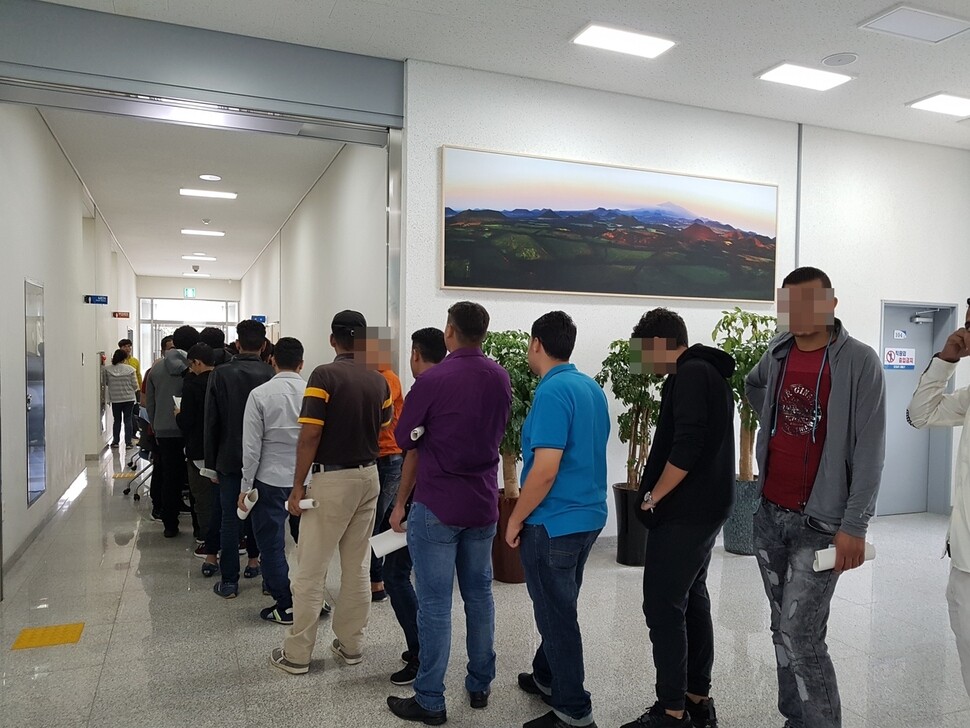hankyoreh
Links to other country sites 다른 나라 사이트 링크
South Korea first Asian country to enact refugee legislation

The “Global Trends” study published on July 19 by the UN Refugee Agency (UNHCR) found that 68.5 million people were living as refugees or had been forced from their homes as of the end of 2017, as the figure increased for the fifth year in a row. The study estimated that 25.4 million refugees had fled their home countries because of conflict and persecution.
South Korea joined the Convention Relating to the Status of Refugees in Dec. 1992, and its Refugee Act took effect on July 2013, making South Korea the first country in Asia with such a law. Even so, it is rare for the government to actually accept applications for refugee status. According to statistics from the Ministry of Justice, 40,470 people have applied for refugee status from Apr. 1994, when the first application was filed, until the end of May 2018. So far, the government has completed its review of 20,361 applications for refugee status, recognizing just 839 of those asylum seekers as refugees. This means that a mere 4.1 percent of asylum seekers are given refugee status. Humanitarian status was only granted to 1,540 foreigners, just 7.6 percent of eligible for such status.
Several European countries that have taken in refugees have relied on sections of their immigration laws about “humanitarian protection” or “supplementary protection” to guarantee basic medical care, labor permits and sojourn rights to applicants even when they are not recognized as refugees. South Korea also issues miscellaneous sojourn rights (the G-1 visa) to humanitarian status holders – individuals who must be allowed to remain in South Korea for a long period of time – but unlike in other countries, these individuals do not receive any social support aside from the right to work.
Humanitarian status holders are excluded from all kinds of public assistance, including social insurance and basic livelihood allowance. Since they are not issued travel certificates, family members who were unable to enter the country together must continue to live apart. Though the US has recently been criticized for its policy of separating children from parents who have entered the country illegally, South Korea’s Refugee Act has basically justified the separation of families from its very conception.
At least South Korea has refugee legislation – something that cannot be said of many Asian countries. According to a study by Jang Bok-hui, a law professor at Sun Moon University, Malaysia has taken in more than 75,000 Rohingya refugees over the past few years, but it has no legislation that can provide these refugees with the right to health care, education or work. Japan was the first Asian country to join the refugee convention, but it has a low rate of acceptance for refugees. More than 10,000 people have applied for refugee status in Japan over more than three decades, but just 5 percent of them have been granted refugee status.
“Protecting refugees should be approached from the level of individual rights, based on the Universal Declaration of Human Rights and excluding political considerations. Refugees from conflict regions should be accepted internationally,” Jang said.
“Since South Korea was the first Asian country to enact refugee legislation and since it has been honoring the spirit of international human rights treaties and the refugee convention by leading the way in refugee policy, this administration’s measures could set an example on the refugee issue.”
By Huh Ho-joon, Jeju correspondent
Please direct comments or questions to [english@hani.co.kr]

Editorial・opinion
![[Column] Season 2 of special prosecutor probe may be coming to Korea soon [Column] Season 2 of special prosecutor probe may be coming to Korea soon](https://flexible.img.hani.co.kr/flexible/normal/500/300/imgdb/original/2024/0426/3317141030699447.jpg) [Column] Season 2 of special prosecutor probe may be coming to Korea soon
[Column] Season 2 of special prosecutor probe may be coming to Korea soon![[Column] Park Geun-hye déjà vu in Yoon Suk-yeol [Column] Park Geun-hye déjà vu in Yoon Suk-yeol](https://flexible.img.hani.co.kr/flexible/normal/500/300/imgdb/original/2024/0424/651713945113788.jpg) [Column] Park Geun-hye déjà vu in Yoon Suk-yeol
[Column] Park Geun-hye déjà vu in Yoon Suk-yeol- [Editorial] New weight of N. Korea’s nuclear threats makes dialogue all the more urgent
- [Guest essay] The real reason Korea’s new right wants to dub Rhee a founding father
- [Column] ‘Choson’: Is it time we start referring to N. Korea in its own terms?
- [Editorial] Japan’s rewriting of history with Korea has gone too far
- [Column] The president’s questionable capacity for dialogue
- [Column] Are chaebol firms just pizza pies for families to divvy up as they please?
- [Column] Has Korea, too, crossed the Rubicon on China?
- [Correspondent’s column] In Japan’s alliance with US, echoes of its past alliances with UK
Most viewed articles
- 1‘We must say no’: Seoul defense chief on Korean, USFK involvement in hypothetical Taiwan crisis
- 2[Column] Season 2 of special prosecutor probe may be coming to Korea soon
- 3N. Korean delegation’s trip to Iran shows how Pyongyang is leveraging ties with Moscow
- 4Korea sees more deaths than births for 52nd consecutive month in February
- 5Amnesty notes ‘erosion’ of freedom of expression in Korea in annual human rights report
- 6[Reportage] On US campuses, student risk arrest as they call for divestment from Israel
- 7[Editorial] New weight of N. Korea’s nuclear threats makes dialogue all the more urgent
- 8‘Weddingflation’ breaks the bank for Korean couples-to-be
- 9[Column] Has Korea, too, crossed the Rubicon on China?
- 10[Column] Park Geun-hye déjà vu in Yoon Suk-yeol